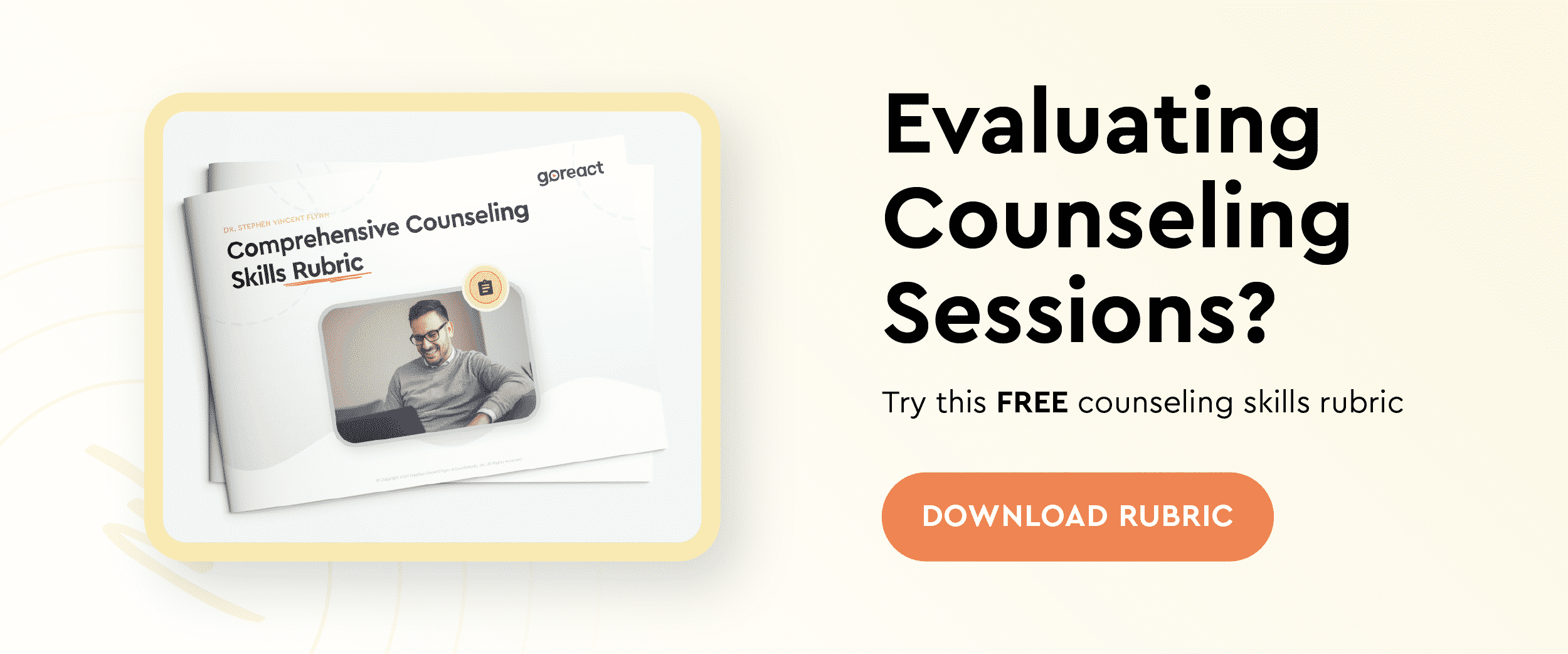How exactly do you evaluate your students’ counseling skills?
Not easily. Even the Fundamentals of Clinical Supervision admits that it’s hard to identify and measure specific skills. And before 2011, if you looked for a well-researched and tested tool to help, you wouldn’t find anything. That’s one of the reasons Dr. Stephen Flynn and Dr. Danica Hays developed a Comprehensive Counseling Skills Rubric in 2015.
The Comprehensive Rubric is young, but it’s a great tool for counseling educators, supervisors, and programs evaluating and helping their students develop counseling skills.

What Counseling Skills Does it Include?
This rubric is comprehensive. That’s why all counseling specialties (e.g., clinical mental health, school, college, marriage and family counseling) can use it. It can also be used at any stage of a student’s graduate work—even the application process.
But how can you be sure that it’s really comprehensive?
For the rubric to live up to its name, Dr. Flynn and Dr. Hays completed a thorough literature review to compile an exhaustive list of counseling skills. Then they pared it down in response to participant feedback and careful consideration of definitions.
What Does it Not Include?
This rubric doesn’t do everything. In fact, the authors clearly state that this comprehensive counseling skills rubric is “not designed to measure other closely related phenomena (e.g., multicultural competency and ethical decision making).”
But this is easy to fix. Dr. Flynn and Hays simply recommend augmenting the rubric with other necessary instruments. Simple, right?
How is it Structured?
Not only is the list of skills comprehensive, but the overall structure ensures a comprehensive evaluation of the counseling session and counselor-client relationship.
There are five foundational areas within the rubric:
Counseling skills
Invitational skills
Attending skills
Influencing skills
Phases of counseling session
Aspects of the counseling relationship
As you can see, the rubric begins with a micro evaluation of invitational skills, attending skills, and influencing skills. But a counseling session is more than these three skill groupings. That’s why the rubric prompts educators and supervisors to analyze different counseling stages (e.g., opening, working, and closing). And finally, the rubric provides the most macro perspective of all by evaluating the entire counseling relationship.
How Can it Can Be Used?
This rubric is intended for training graduate-level mental health professionals (i.e. MFT, counseling, social work). It may also be used in a myriad of ways by counseling educators, supervisors, and programs.
1. Self-Assessment
Counseling trainees—or even professional counselors—can use this rubric to assess their own counseling skills. Reflection is crucial for any professional to grow and improve, and this rubric helps trainees and professional counselors develop self-reflective skills.
2. Assessing & Coaching Trainees
Obviously, you can use the rubric to assess students at key moments in their training. But also consider using the rubric consistently throughout a trainee’s professional preparation and postgraduate practice. Comprehensive evaluations throughout a training help students take ownership of their progress and make changes to improve specific weaknesses.
3. Assessing & Improving Supervisions
Similarly, supervisors can use the growth of their trainees as a report card on their role as a supervisor. For example, by using this rubric a supervisor may notice that their trainees don’t improve their attending skills.
4. Assessing & Improving Programs
If all of the supervisors use the same rubric, it creates interrater reliability to evaluate the program. Or in the authors’ own words, this rubric can help identify “macro training deficiencies.”
5. Gatekeeping & Admissions
Not to sound like a meme from Ghostbusters, but counseling educators and supervisors are gatekeepers. As gatekeepers of the profession, counselors can use this rubric to provide evidence when a trainee isn’t prepared or fit to become a counselor. The authors even recommend using a version of the rubric for the admissions process. This can provide valuable “tangible evidence supporting a decision to decline admission.”
Does it Really Work?
Now for the most important question of all: will this comprehensive rubric effectively identify and measure students’ counseling skills?
The short answer is yes. The long answer is that Dr. Flynn and Dr. Hays tested the rubric by completing careful steps for interrater agreement and interrater reliability.
And the positive results with interrater agreement and interrater reliability led Dr. Flynn and Dr. Hays to conclude that “the CCSR is a psychometrically sound transtheoretical instrument designed to evaluate counseling trainee’s ability to execute the counseling experience.”
For more specifics about the methods, read their publication “The Development and Validation of the Comprehensive Counseling Skills Rubric.” And if you’re ready to try out the rubric yourself to assess your own students’ counseling skills, you can download the counseling skills rubric right now for free.
Want more ways to enhance clinical supervision? Read 3 Ways to Elevate Counseling Supervision.







![A Comprehensive Counseling Skills Rubric for Educators and Supervisors [Download]](https://get.goreact.com/wp-content/uploads/2019/10/A-Comprehensive-Counseling-Skills-Rubric-for-Educators-and-Supervisors-Download-Feature-Image.png)

